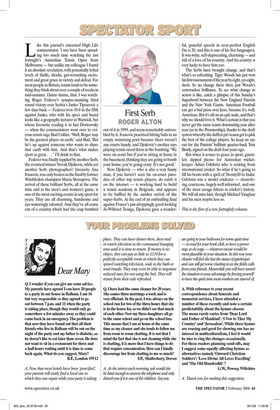L ike this journal’s esteemed High Life commentator, I too have
been spending too much time watching the last fortnight’s Australian Tennis Open from Melbourne — but unlike my colleague I found it an absolute revelation, with potentially lethal levels of thrills, shocks, gut-wrenching excitement and great grace in victory and defeat. For most people in Britain, tennis tends to be something they think about over a couple of weeks in mid-summer. Damn shame, that. I was watching Roger Federer’s synapse-stunning third round victory over Serbia’s Janko Tipsarevic a few days back — Federer won 10-8 in the fifth against Janko, who with his specs and beard looks like a geography lecturer at Warwick, but whose favourite reading is in fact Dostoevsky — when the commentators went over to veteran tennis sage Bud Collins. ‘Well, Roger may be the greatest player on earth,’ said Bud, ‘But he’s up against someone who wants to share that earth with him. And that’s what makes sport so great ... ’ I’ll drink to that.
Federer was finally toppled by another Serb, the eventual winner Novak Djokovic, while yet another Serb, photographers’ favourite Ana Ivanovic, was only beaten in the final by former Wimbledon champion Maria Sharapova. The arrival of these brilliant Serbs, all at the same time and in the men’s and women’s game, is one of the most exciting events in any sport for years. They are all charming, handsome and eye-wateringly talented. And they’ve all come out of a country which had the crap bombed out of it in 1999, and seem remarkably untroubled by it. Ivanovic practised hitting balls in an empty swimming pool because there weren’t any courts handy, and Djokovic’s mother says playing tennis saved them in the bombing. ‘We were on court but if you’re sitting at home in the basement, thinking they are going to bomb your home, you’re going crazy. It’s not good.’ Now Djokovic — who is also a very funny man; if you haven’t seen his on-court parodies of other top tennis players, do catch it on the internet — is working hard to build a tennis academy in Belgrade, and appears to be baffled by the sudden arrival of the super-Serbs. At the end of an enthralling final against France’s jaw-droppingly good-looking Jo-Wilfried Tsonga, Djokovic gave a wonder ful, graceful speech in near-perfect English (he is 20, and this is one of his five languages). It was witty, self-deprecating, charming — and full of a love of his country. And his country is very lucky to have him too.
The Serbs have brought change, and that’s what’s so refreshing. Tiger Woods has just won his first tournament of the year by eight, yes eight, shots. So no change there then, just Woods’s remorseless brilliance. To see what change in action is like, catch a glimpse of this Sunday’s Superbowl between the New England Patriots and the New York Giants. American Football can get a bad press over here, because it’s, well, American. But it’s all on an epic scale, and that’s why we should love it. What’s certain is that you never get the same teams dominating year after year (as in the Premiership), thanks to the draft system whereby the duffest pro teams get to pick the best of the college players. So keep an eye out for the Patriots’ brilliant quarter-back Tom Brady, signed on the draft four years ago.
But when it comes to grace in sport, gauntlets dipped please for Australian wicketkeeper Adam Gilchrist who is retiring from international cricket. So what if he’s going to fill his boots with a spell of Twenty20 in India: Gilchrist was a model cricketer — clean-living, courteous, hugely well informed , and one of the most savage hitters in cricket’s history. We will all miss him, though Michael Vaughan and his men maybe less so.
This is the first of a new fortnightly column.


































































 Previous page
Previous page